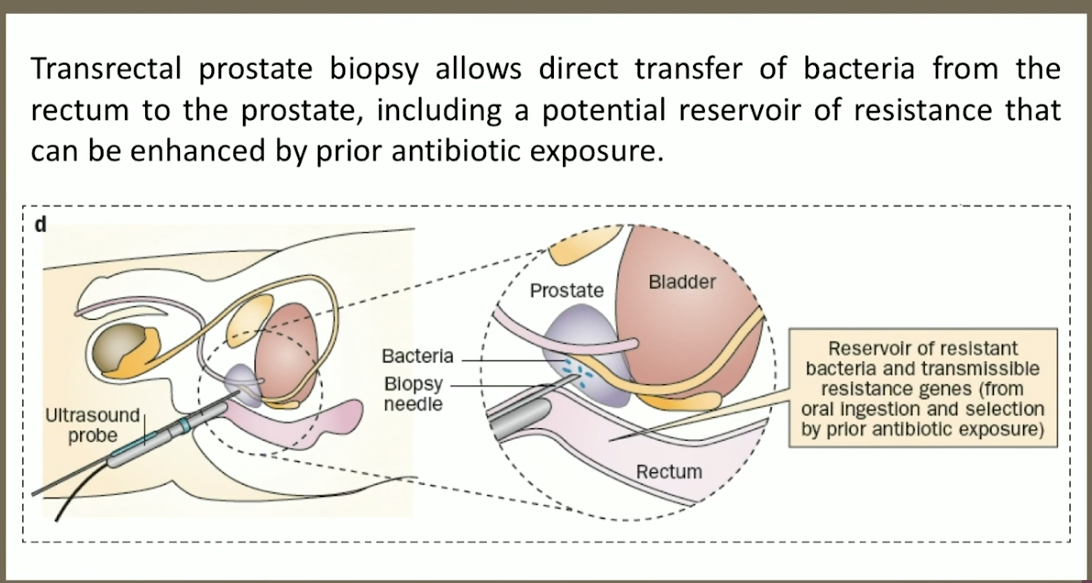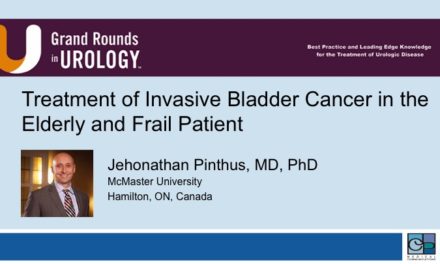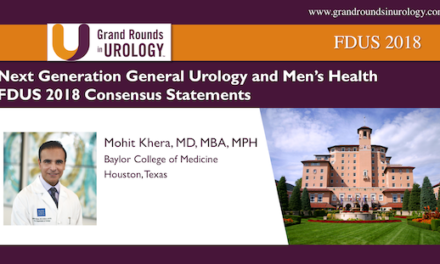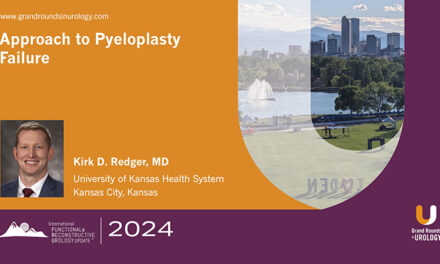Laila E. Woc-Colburn, MD, DTM&H, FACP, FIDSA, presented “Targeted Antimicrobial Prophylaxis for Transrectal Prostate Biopsy” during the 23rd Annual Innovations in Urologic Practice on September 14, 2018 in Santa Fe, New Mexico.
How to cite: Woc-Colburn, Laila E. “Targeted Antimicrobial Prophylaxis for Transrectal Prostate Biopsy” September 14, 2018. Accessed May 2025. https://grandroundsinurology.com/targeted-antimicrobial-prophylaxis-for-transrectal-prostate-biopsy/
Targeted Antimicrobial Prophylaxis for Transrectal Prostate Biopsy – Summary:
Laila E. Woc-Colburn, MD, DTM&H, FACP, FIDSA, discusses the current scope of antibiotic resistance and risk factors for infectious complications in transrectal biopsy. She also reviews a questionnaire developed for assessing risk factors and the use of a rectal swab to direct antibiotic prophylaxis.
Abstract:
Prostate biopsy is the most frequently performed outpatient procedure in urology. Unfortunately, according to Veterans Affairs Healthcare System data, approximately 5-10% of the one million biopsies performed in the United States per year become infected. Post-interventional complications include urogenital infections in 1.0–17.5% of cases, hematuria in about 65.8%, as well as a worsening of lower urinary tract symptoms in up to 25%. The diffusion of antimicrobial resistant strains plays a key role in the development of these complications. For that reason, the increased resistance in these cases can cause difficulty in prophylaxis.
The use of prebiopsy rectal swab culture to direct antibody prophylaxis is more effective than using one set method to treat every patient. In multiple studies, targeted antimicrobial prophylaxis achieved a low rate of infectious complications in patients. This supports the wide application of an individualized method of prophylaxis.
Analyzing the use of ciprofloxacin, trimethoprim/sulfamethoxazole, fosfomycin trometamol, gentamicin, ceftriaxone, and ertapenem in both the hospital and practice settings will establish the most effective methods for avoiding post-interventional complications. Physicians must always choose antibiotic prophylactic regimens with attention to the principles of antimicrobial stewardship. In order to achieve this, physicians should choose these regimens according to local resistance patterns. Finally, augmented and targeted prophylaxis represent powerful options for reducing infections with antimicrobial stewardship.
About Innovations in Urologic Practice
Innovations in Urologic Practice (IUP) is an annual CME-accredited conference devoted to updating urologists on the rapidly changing healthcare environment. Topics focus on innovative diagnostic and treatment strategies, controversies, new and currently developing technologies, and challenges in today’s urologic practice. Dr. Woc-Colburn presented this lecture during the 23rd IUP in 2018. Please visit this page in order to learn more about future IUP meetings.
ABOUT THE AUTHOR
Dr. Woc-Colburn is an Associate Professor in the National School of Tropical Medicine as well as in the Infectious Diseases Department at Baylor College of Medicine, Houston, TX. She also serves as Director of Medical Education in the National School of Tropical Medicine and Medical Director of the Baylor Medicine Infectious Disease Group and the Tropical Medicine Clinic at Baylor. She received her MD from Universidad Francisco Marroquin, Guatemala City, Guatemala. She was recruited by the Infectious Diseases Department at Baylor College of Medicine in 2010 to start the HIV/AIDS transition service at Ben Taub Hospital/Harris Health System, Houston, TX. She went on to start the first tropical medicine clinic at Ben Taub Hospital/Harris Health System. Since 2012, she has helped oversee infectious disease cases at Baylor St. Luke’s Medical Center, Houston, TX. Her professional interests include tropical medicine, HIV/AIDS patient care, medical education, endovascular infections, fungal infections, and non-tuberculosis mycobacterium. Dr. Woc-Colburn received the Norton Rose A. Fulbright Faculty Excellence Award in 2016, and the Rising Star Clinician Award in 2015, reflecting her commitment to both medical education and clinical excellence. Dr. Woc-Colburn is a fellow of the American College of Physicians and the Infectious Disease Society of America, as well as a member of the American Society of Tropical Medicine and Hygiene, the International Antiviral Society, and the Asociación Guatemalteca Enfermedades Infecciosas.





